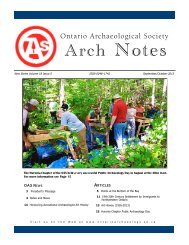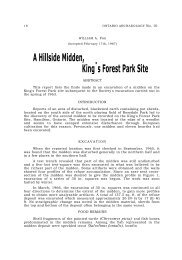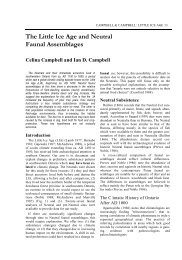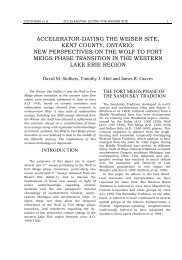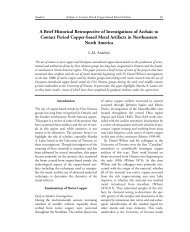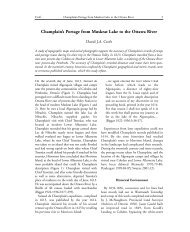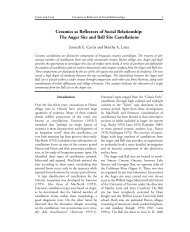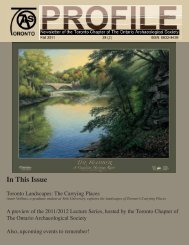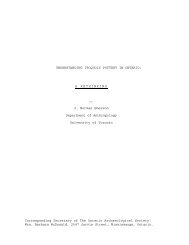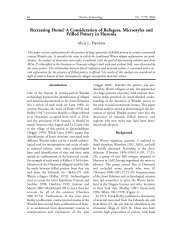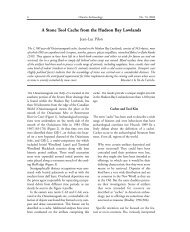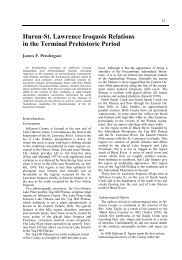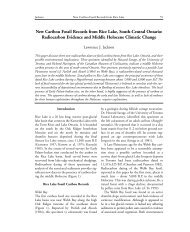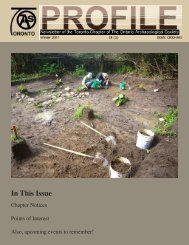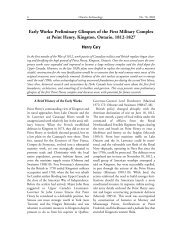THE CLANS AND PHRATRIES OF THE HURON John Steckley ...
THE CLANS AND PHRATRIES OF THE HURON John Steckley ...
THE CLANS AND PHRATRIES OF THE HURON John Steckley ...
Create successful ePaper yourself
Turn your PDF publications into a flip-book with our unique Google optimized e-Paper software.
30 ONTARIO ARCHAEOLOGY NO.37<br />
The entry in the FHO dictionary which provides the evidence on the clan and phratry<br />
structure of the Huron is listed under "Aumoirie" ('Armoirie ' in modern French) or `armorial<br />
sign'. There are eight of these signs, said by the author (probably Chaumonot) to represent the<br />
"nations" or "families" of the Huron. The Huron term used in this entry is `,entiok8a' (the -,-<br />
being like -y-, the -8- being a -w- before vowels and a -u- before consonants). This noun is<br />
derived from the verb ",entio", which in Father Pierre Potier's 18th century Huron/Wyandot<br />
dictionary is given as referring to the "band" of an individual, or, more significantly, his or her<br />
"parenté" -specifically his or her "paren/t/s du cote de la mere" (Potier 1920:393 #13).<br />
The relevant material in the entry is presented in Table 1.<br />
TABLE 1<br />
FHO DICTIONARY ENTRIES<br />
Sign Gloss "Nation" or Clan Word Stem<br />
"An c nion,en ours Atinnia8enten Annia8enten<br />
hatin c nion,en<br />
oskennonton cerf sontennonk Skiatennon<br />
Andia8ich tionnenria honnontre/a/ Ontrea<br />
hotienrotori<br />
Cenrotori<br />
Ets8tai castor Satichiohare Tsochiohare<br />
Annaarisk8a loup hatinnaarisk8a Ahonrek<br />
h8enh8en huart hoti c ra,on o c ra,on<br />
Andesonk hatindesonk Arenre<br />
hatiraenre<br />
Andatsatea renard Andatse c ronnon Skanda,ona "<br />
TRANSLATIONS<br />
"An c nion,en" and "hatin c nion, en" are both derived from a verb meaning roughly `to be a<br />
bear' (Potier 1920:451; FHO "animaux"). The first term means `a bear', the second `they are<br />
bears'. "Atinnia8enten" and "Annia8enten " both stem from a verb meaning something like<br />
`to be in or of the country of the bear' (Potier 1920:450). The former, meaning `they are of<br />
the country of the bear', was also the name of the so-called Bear `tribe' of the Huron<br />
(Heidenreich 1971:301).<br />
`Oskennonton ' and cognate terms are used to refer to deer in Several Iroquoian languages<br />
(Barbeau 1961:168). It has the literal meaning of `one who goes to or is in the land of the dead '<br />
(Potier 1920:352 #60). "Sontennonk " and "skiatennon " seem to be derived from a verb<br />
meaning `to keep, take care of something or someone' (Potier 1920:378). The fact that in later<br />
years this was the clan of `Sastaretsi ' , the hereditary chief of the Wyandot (Potier 1920:151)<br />
suggests that they might have been the `keepers' of political authority or of the office of<br />
hereditary chief.<br />
"Andia8ich " was the Huron word for `turtle' (Potier 1920:449; FHO "animaux " ). The word<br />
"tionnenria " means `where or when there is a small group' (constructed with the noun<br />
",annenra " meaning "armee ... troupe . . . bande d'animaux, d ' oiseaux " (Potier 1920:450)<br />
and the verb "a " meaning `to be such a size' (Potier 1920:160 #1). This makes sense when the<br />
translations for the rest of the words in the phrase are given. "Honnontre/a/ " is derived from a<br />
verb "atrea " , meaning `to be a grandchild (maternal) ' (Potier 1920:203 #43, and can be



